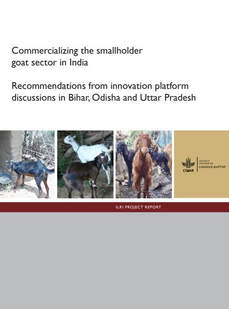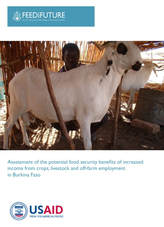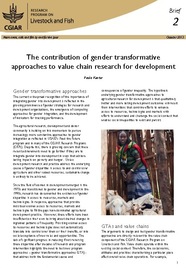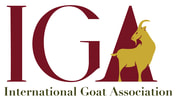|
A report to the Small Ruminant Production Enhancement Project (SRPEP) by the International Livestock Research Institute in support of The Gambia’s livestock master plan
Karl M. Rich, Sirak Bahta, Abdrahmane Wane, Francis Wanyoike and Isabelle Baltenweck Study context The Gambia is the smallest country in West Africa, spanning just 11,300 square kilometres, with a high population density (176 people per square kilometre). It shares a single 749-kilometre overland border with Senegal. About 57% of its population is reported to live in urban areas. The total population in The Gambia is expected to gradually rise in the next three decades to approximately 4.3 million people, requiring anticipative policies concerning both infrastructure development and food supply improvement (Nyoni et al. 2019). The Gambia’s economy relies heavily on the tourism and agriculture sectors. The gross domestic product (GDP) grew by 6% in 2019 against a 6.5% growth in 2018, predominantly with an increase of 10% of services supported by wholesale and retail trade while the agriculture sector contracted by 10% (World Bank 2020). The agriculture sector remains too dependent on weather conditions, predominantly traditional and is characterized by low input extensive system of husbandry. Moreover, the Gambian agricultural sector struggles to overcome its key long-term development challenges related to the country’s undiversified economy, small internal market, limited access to resources, lack of skills necessary to build effective institutions, high population growth, lack of private-sector job creation and high rate of outmigration. More specifically, the agricultural sector suffers from a structural inability to produce more and better, respond to increasing demand for livestock products and sustain a better life from livestock. Agricultural productivity in The Gambia remains quite low and, in turn, has significant adverse implications for the economy.
0 Comments
Small Ruminant Consultant wanted by ILRI in Ethiopia to develop "Integrated herd health intervention (i.e., vaccination, deworming, treatment and awareness creation campaigns) to reduce the impact of small ruminants’ diseases" The Position: The International Livestock Research Institute (ILRI) is looking to hire a Consultant in Animal and Human Health program.
General: The International Livestock Research Institute (ILRI) works to improve food and nutritional security and reduce poverty in developing countries through research for efficient, safe and sustainable use of livestock. It is the only one of 15 CGIAR research centers dedicated entirely to animal agriculture research for the developing world. Co-hosted by Kenya and Ethiopia, it has regional or country offices and projects in East, South and Southeast Asia as well as Central, East, Southern and West Africa. www.ilri.org. Background: Integrated herd health intervention (i.e., vaccination, deworming, treatment and awareness creation campaigns) is preferable to reduce the impact of small ruminants’ diseases since fragmented individual interventions of animal health challenges may not be able to generate sufficient benefits to increase production and productivity. On the other hand, dealing with individual problems might have a small impact, or the impacts might not last long and could also be more expensive to implement. It is known that when farmers participate in defining approaches toward the control and prevention of small ruminant diseases, the results are directly applicable to their own experience and lead to significant improvements in productivity and promote lasting behavior change. The activities in this project focus on small holder farmers who use communal grazing lands and are intended to be undertaken with full engagement of farmers and other stakeholders with a vision to ensure that interventions continue beyond the duration of the project. The project is being implemented in four small ruminants value chain sites: Menz, Bonga, Doyogena and Sekota – Abergelle.  Recommendations from innovation platform discussions in Bihar, Odisha and Uttar Pradesh Summary In 2015, the Bill & Melinda Gates Foundation (BMGF) and the International Fund for Agricultural Development (IFAD) launched a scoping project for “Public Private Producer Partnerships (PPPPs) in small ruminant value chain development in India” with a view to build a solid understanding among goat industry stakeholders (public and private) on the profitability, competitiveness, and importance of investing in the goat sector as a mean to enhance the livelihoods of and business opportunities for poor farmers in the rural areas of Bihar, Odisha and Uttar Pradesh. Contributing to this scoping project, the International Livestock Research Institute (ILRI) established a participatory process of constructive engagement of all relevant stakeholders in the sector through the Innovation Platform (IP) approach1. ILRI organized and facilitated two rounds of IP meetings in the three states. In these meetings more than 250 participants with different backgrounds and interests (farmers, producer organizations, private and public service providers, market agents, processors, regulatory agencies, development organizations, finance institutions, research institutes and policy makers) came together to jointly diagnose problems, identify opportunities and find ways to achieve their goals. The first round of discussions were very broad and general in which participants identified constraints and suggested broad areas for improvement (Table 1). In the second round, discussions were more specific to help develop business cases for goat production, buck production, last mile service delivery, fodder production and small scale processing. READ MORE... Burkina Faso study quantifies impact of sustainable intensification on household food security9/20/2018  Download the report Download the report Sustainable intensification (SI) of agricultural production has become a predominant theme in development agendas in West Africa. But despite the availability of a wide range of technologies for adoption, uptake has been very minimal. One reason for the often-disappointing uptake of technologies could be poor targeting of households. Researchers at the International Livestock Research Institute (ILRI) have analysed and quantified the potential food security impact of boosting a set of sustainable intensification options in Burkina Faso to better identify which technologies would fit the characteristics of specific households. The research activities were designed to be solution-focused to meet the needs of farmers and were implemented in Seno and Yatenga provinces in the Sahelian zone of the country. The basis of the study is that there is a great potential for smallholder farmers engaged in crop-livestock systems, to produce more in a given area of land, thereby improving productivity, food security and nutrition while preserving ecosystem services. READ MORE… Making the Case: Sustainable Livestock for Development
Livestock are critical for sustainable development yet often overlooked. The world’s cows, sheep, goats, pigs, poultry and other farm animals are the mainstay of livelihoods across the developing world. And the energy and nutrient-dense milk, meat and eggs these animals produce provide hundreds of millions of families in the world’s poorer countries with basic livelihoods, incomes, food and nutrition. The contribution of gender transformative approaches to value chain research for development1/31/2014  Gender transformative approaches The current widespread recognition of the importance of integrating gender into development is reflected in the growing prominence of gender strategies for research and development organizations, the emergence of compelling approaches for gender integration, and the development of indicators for tracking performance. The agricultural research, development and donor community is building on this momentum to pursue increasingly more substantive approaches to gender integration as reflected in USAID’s Feed the Future program and in many of the CGIAR Research Programs (CRPs). Despite this, there is growing concern that these recent achievements need to go further if they are to integrate gender into development in ways that achieve lasting impacts on poverty and hunger. Unless development research and practice address the underlying causes of gender disparities in access to and control over agriculture and other valued resources, sustainable change is unlikely to be achieved. WANT TO READ MORE, DOWNLOAD A COPY HERE. Presented by Barbara Rischkowsky (ICARDA) at the Workshop on ICARDA-ILRI Training on Tools for Benchmarking Sheep and Goat Value Chains in Ethiopia, Addis Ababa, 6-9 November 2013.
|
IGA Blog
The International Goat Association promotes goat research and development for the benefit of humankind, to alleviate poverty, to promote prosperity and to improve the quality of life. Archives
May 2024
Categories
All
|
|
International Goat Association
2516 Millbrook Rd., Little Rock, AR72227 USA email: [email protected] -454-1641 |

 RSS Feed
RSS Feed